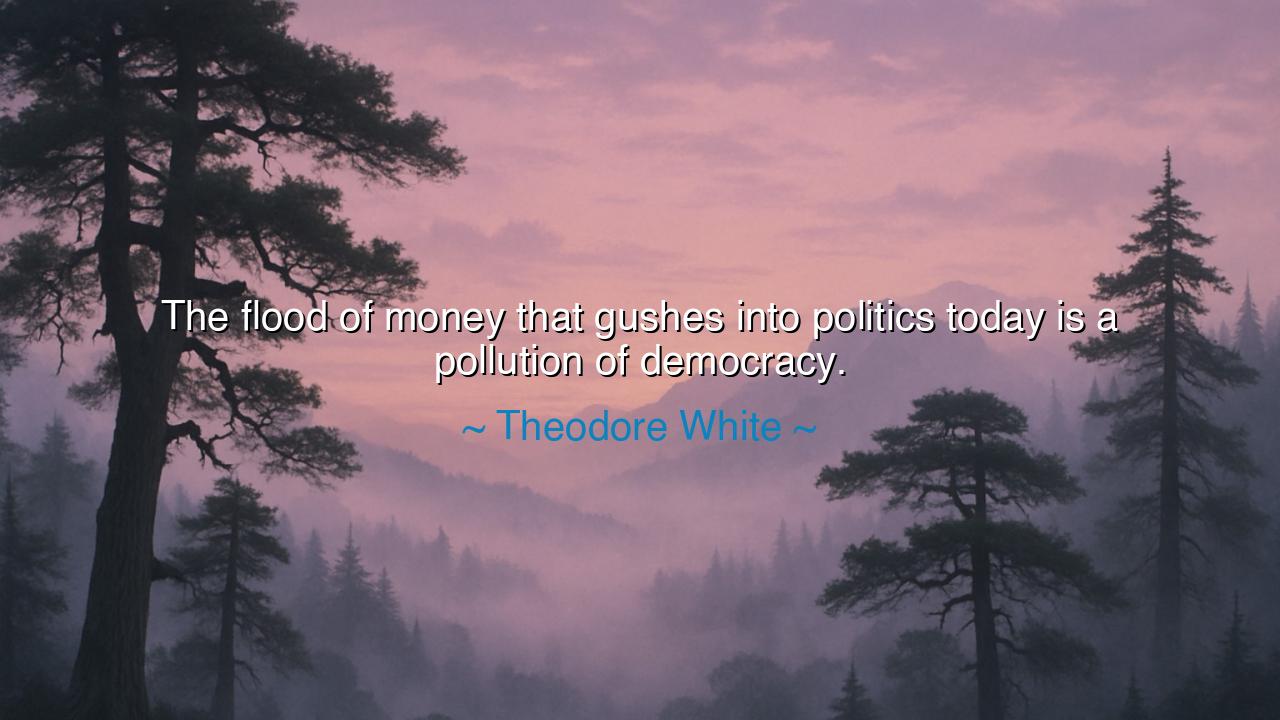
The flood of money that gushes into politics today is a






Theodore White, chronicler of American politics and historian of power, once warned with grave eloquence: “The flood of money that gushes into politics today is a pollution of democracy.” In these words, he cast light upon the corruption that seeps into the very heart of self-government. For democracy is meant to be the voice of the people, yet when money becomes its lifeblood, that voice is drowned beneath the roar of wealth. What should be a river of justice becomes a torrent of influence, carrying with it the decay of trust.
The origin of this declaration lies in White’s long observation of elections in the United States. As the author of The Making of the President series, he studied how campaigns were waged, how messages were shaped, and how decisions were swayed. Over time, he saw the rising tide of money—not as servant to democracy, but as its master. Television ads, lobbying empires, and fundraising machines transformed politics from a contest of ideas into a marketplace of power. His words were not just analysis but lamentation, for he knew that unchecked wealth corrodes the foundation of freedom.
History offers us the example of the Gilded Age, when railroad barons and industrial magnates poured fortunes into Congress, buying votes as easily as stock. Senators were chosen not by the people, but by legislatures dominated by wealthy interests. The people’s will was silenced beneath mountains of gold. It was only through reform—the rise of the Progressive movement and the passage of campaign finance laws—that the tide was briefly checked. White’s warning reminds us that the danger did not vanish; it only changes form with each age.
Even in modern times, we see the truth of his words. Supreme Court rulings that unleash vast sums into elections have made campaigns ever more dependent on donors. The citizen with one vote stands against the corporation with millions of dollars. Here lies the pollution of democracy—not in open tyranny, but in the slow poisoning of equality, where wealth dictates policy and the poor are left unheard.
Therefore, O guardians of liberty, heed this wisdom. A nation that allows money to govern its politics allows its democracy to wither. Purity must be restored, not through silence of wealth alone, but through vigilance of the people, who must demand that their leaders answer to citizens, not to coin. For when money becomes the master of politics, democracy itself becomes the slave.






LANguyen Thi Lan Anh
This quote resonates deeply in an era where fundraising and financial influence dominate political campaigns. The idea that money pollutes democracy raises questions about the integrity of our political system. How can we expect politicians to serve the public's best interests when they are heavily reliant on the donations of corporations and lobbyists? Shouldn’t we be working toward a system where every voice can be heard equally, without financial barriers?
THtran hieu
White’s statement is a sobering reflection on the current state of politics. The flood of money may not only distort public policy but also erode trust in democratic institutions. If the public sees that elections are bought rather than earned, will they begin to lose faith in the process altogether? What steps can be taken to limit the influence of money in politics and return power to the people?
HPtuan hung phan
Theodore White’s quote really highlights a core issue with modern democracy. Is it possible for a system to truly be democratic when financial backing seems to determine who gets heard and who doesn't? What happens to the voices of marginalized or less wealthy individuals in a system so heavily influenced by money? How can we restore fairness and ensure that political campaigns are accessible to all, regardless of their financial situation?
TKtuong khanh
The idea that money has polluted democracy is unsettling but not surprising. In a system where candidates must raise millions to run viable campaigns, how are less affluent individuals supposed to compete? Does this mean democracy is only available to the highest bidder? If money continues to flow unchecked into politics, will we ever see a true representation of the people's interests?
8K8/1 Khang
This quote rings especially true in today’s political climate, where fundraising seems to outweigh policy debates. When money plays such a dominant role in elections, how do we ensure that democracy is truly reflective of the people's will, not the interests of the wealthy? Shouldn't our democracy prioritize the voice of the average citizen, rather than the financial power behind the candidates?